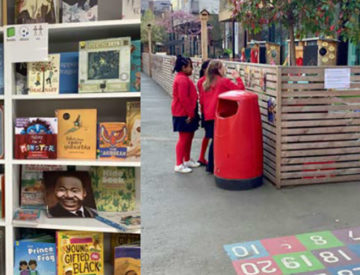
In March, we went to London to visit two research schools and our colleagues from the Education Endowment Foundation. It was 2 days full of inspiration and wise lessons.
Jan 25, 2021
By

Corona crisis: effective teaching and tackling learning disadvantages
During the Covid-19 crisis, schools had to change their teaching methods several times. This had to be done at a fast pace. The crisis came unexpectedly and immediately demanded enormous efforts from the education sector to keep the quality of education high. Despite everything that has been done so far to limit the negative consequences of the Covid-19 crisis, preliminary research shows that the learning disadvantages of vulnerable pupils have increased substantially in the past year. The urgency to catch up is high. If this does not happen, the corona crisis will have lasting negative effects on the development opportunities of children and will therefore perpetuate inequality of opportunity in the longer term.
In order to minimise the negative effects of the COVID-19 crisis on children, it is important to know quickly
• what works,
• how it works and
• what the important conditions are for making it workable in educational practice.
That is why we think it is important that the choices schools make to improve the quality of education should be based on insights from research and science.
Cooperation to close the gap between research and educational practice
However, we also know how difficult it can be to translate these insights into classroom practice. For all sorts of reasons, it is difficult to change educational practice and bring it into line with the knowledge gained from research. There are many different insights, which sometimes contradict each other. Often, teachers do not know which criteria to use to assess the quality of research and how to separate the wheat from the chaff. Or you may not know how to best analyse and apply the insights of scientific research in your work situation. Finally, in education, there is a structural shortage of time for reflection and evaluation.
Thanks to a grant from ZonMW, Education Lab NL and Martin Bootsma and Eva Naaijkens of the Alan Turings School in Amsterdam entered into a partnership in October 2020 with the aim of bridging the gap between educational practice and science. And this is only possible if we all try to contribute to the creation of effective solutions from our own knowledge and expertise.
We cooperate in four different areas:
(1) We analyse the needs of the field. Together and in consultation with other colleagues from the educational field, we have defined a number of burning practical issues of this period and looked at possible causes of the underlying problems. These are questions such as: How can we best use extra teaching time to catch up on learning deficits? How can we increase parent involvement? And: How can distance learning best be designed?
(2) We research promising approaches and provide guidance for schools. On the basis of a literature study, we identify promising approaches for catching up learning disadvantages. The literature study is based on research that can distinguish cause and effect, so-called experimental or quasi-experimental research. This allows us to estimate the effects of an approach as well as possible. The review primarily looks at studies carried out in EU countries and in the United States.
(3) We make a translation to the Dutch practice. We try to understand better what exactly has proven to be effective in another country in a similar context. And whether a similar approach would also work in the Netherlands and, if not, what adjustments would be necessary. At the same time, we are looking for promising ideas from our own practice and experience. By juxtaposing these insights, concrete new ideas emerge about what could be effective in catching up on learning disadvantages. In addition, we gain insight into what we do not yet know and what further research would be required to create these insights.
(4) We share our insights. In the next three months, we will translate the insights from this joint research into tools for schools. In these, general recommendations will also be converted into practical and concretely described approaches for schools that aim to better answer the HOW question. Here, we will build on the previously developed quality maps by Martin Bootsma and Eva Naaijkens (Enigma Education).
Do you want to know more and use insights from our research for your own school? Keep following us on this website and of course via social media.